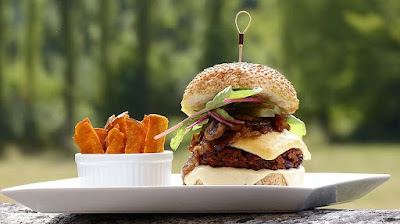Modern 'conventional' farming: too big, too uniform, too much fancy technology, too hype-ridden, and unsustainable.
Paving the way for the acceptance of Westminster's consultation on the regulation of genetic technologies, an opinion piece, written by a top UK crop-pest scientist, was published in the
Guardian newspaper. Its headline was:
"Science can rescue farming. Relaxing gene editing rules should be the start"
The villains that farming needs to be rescued from are "new (climate-change driven) plant diseases moving rapidly around the world", and some old plant diseases (such as the blight which caused the Irish potato famine in the 1840s) which still plague us, and the skill and patience required for the long process of conventional plant breeding.
The heroes which will rescue farming are super-fast, precise, trait-specific new crops courtesy of gene editing.
The article also acknowledged that, before farming can be rescued by gene-editing, gene editing will have to be rescued from negative consumer opinion.
Take a step back and look at why our agriculture is being caught so far on the back foot that it needs rescuing.
In old-style 'conventional' plant breeding (a.k.a. 'domestication'), seed is saved, exchanged locally, and possibly selected for planting the following year. The plants evolve* alongside the farmers and everything else which shares their mutual environment. Farmers are producers with key skills in food production, while their naturally genetically-diversified crops evolve into new genetically-diversified crops.
* Note Evolution is an ongoing, ecosystem-wide shifting to new states of equilibrium as all organisms interact with each other and with their non-living environment. "Like all organisms, humans alter the environments around them in ways which have evolutionary consequences" (Mueller and Flachs) Seventy years of the inappropriately named 'green' revolution have given us new-style 'conventional' (a.k.a. 'traditional') intensively-bred crops which are mainly inbred-hybrids. Such crops have uniform genetics and often include desired traits induced by humans using random mutagenesis (absent safety testing). They are developed off-farm with a prime focus on high yield to supply a globalised market. Key to growing such crops are chemical inputs (fertilisers and pesticides), the cash to buy the inputs and new seed every year, water, and the machines to enable uniform planting, multiple chemical applications, and harvesting on a vast scale. Add to these, government subsidies and an elaborate market infrastructure. Farmers growing them have become consumers of whatever seed, chemicals and machines their suppliers want to flog them.
The green revolution's monocultures and transportation of seeds around the world are big players in the global spread of plant diseases (the ones gene-editing will 'rescue' farming from), and climate change.
The focus on yield, uniformity and scale has long side-lined the nutritional value, taste and sustainability of the crop, and the needs and knowledge of the local people, and evolution. While the on-farm environment keeps changing, just like it always has, industry-supplied inbred-hybrid seed has no capacity for evolution.
The latest shift in agriculture is to crops which have been genetically modified (GM) or gene edited (also GM). These have desired specific traits engineered into them in the laboratory. In a desperate attempt to normalise these GM creations, genetic modification has been absurdly described as "a continuation of the ancient process of (crop) domestication" by which humans "have been manipulating their crops for millennia". Gene-editing takes the public sedation exercise a stage further: it "could happen in Nature" and “allows us to give Mother Nature a helping hand to accelerate the process of evolution". Since all GM traits are bred into existing crops varieties with uniform genetic backgrounds, they are quite clearly nothing to do with old-conventional, evolving, plant breeding and everything to do with new-conventional, non-evolving, green revolution crop production.
Consumers have every reason to be just as uncomfortable with gene editing as they were with genetic modification.
For one thing, there's the science (which isn't difficult to find or to grasp):
- Apart from the question of functional disturbances in the genome caused by the intended DNA change, there's a mounting body of evidence that the gene editing process itself induces damage elsewhere in the genome [1,2,3].
- The latest alarming discovery is the possibility that CRISPR gene editing can cause the chromosome to shatter and re-assemble haphazardly, with who-know-what effects on the GM organism.
- Crop scientists check the success of their genetic engineering by looking for the desired edit at the 'precise location': random wreckage elsewhere remains invisible.
For another thing, as some concerned New Zealand scientists pointed out "the risk of harm from gene technology accumulates over time and scale of production". If Big Biotech gets its way on the scale of gene-tech crops grown all over the world, it's just a matter of time before the risk of harm becomes actual harm.
Then, there's the desperate and unconvincing propaganda such as that described above. As the concerned scientists in New Zealand pointed out, "the risks from technology don't disappear by calling it natural" (and, an edited gene doesn't become natural by calling it evolution).
Suggestions in the crop-pest scientist's article for tackling the public confidence deficit in gene editing include the need for transparency and a 'national debate'. That same month, a letter published in
Nature Biotechnology advanced principles for 'Responsible governance of gene editing in agriculture and the environment' which included 'robust, inclusive societal engagement'. Note that no one's suggesting any need for safety testing to reassure the public. What all that transparency, debate and engagement sounds like is a smokescreen for 'educating' the public to want this new-fangled GM food, just like in the 1990s when the first old-style GM crops emerged from the field.
Relaxing gene editing rules' as suggested by the top UK crop scientist translates into a means to avoid safety testing. Indeed, the outcome of the 'consultation' is that UK regulators will now permit field trials of gene-edited crops without risk assessment, and new legislation to exclude gene-edited organisms from the definition of a GMO is now on Westminster's agenda.
OUR COMMENT
The hype surrounding all things GM hasn't changed in quarter of a century. Don't let yourself be 'educated' to think that gene-edited foods will ever be anything but a quick, commercially-lucrative patch shoring up an over-sized unsustainable system with multiple opportunities for harm to health.
The top UK crop scientist acknowledged that "Organic farming has provided us with creative and powerful alternatives for how we grow food" and hints that combining crop 'improvement' using gene-editing with organic methods could be a solution for sustainable agriculture. Obviously giving Mother Nature a helping hand ... and giving the biotech industry an even bigger helping hand while compromising our future organic food supply. Organic farming doesn't need rescued, but it will if genetic engineers get their hands on it.
Ask your MP to take action. Rather than rush simplistic gene edited 'improved' crops to market, the UK government must promote small-scale, diversified, climate-friendly, unadulterated organic, regenerative, and agro-ecological methods that work with nature and put farmers back in the driving seat. In that way, farming might actually rescue itself along with our health, our food supply and our future.
In Scotland, our Environment Minister tells us: "Scotland's policy towards GMOs has not changed, and we have no plans for a similar review. As for gene editing, we are disappointed DEFRA would choose to move unilaterally on this. The Scottish Government is committed to keeping aligned with the EU, and we are monitoring the EU's position closely".
Now is a good time to tell your MSP that you don't trust the new gene technology trajectory of English agriculture and that you fully support Scotland's no GM and no gene editing policy.
Background
[1]
THE PRECISION PROBLEM IN GENOME EDITING - August 2021
[2]
CRISPR'S EPIGENETIC SCARS - August 2021
[3]
CRISPR CATASTROPHE IN THE MAKING - August 2021
SOURCES:
·
DEFRA Consultation outcome, Genetic
technologies regulation: government response, updated 29.09.21
·
Nick Talbot, Science can rescue farming.
Relaxing gene editing rules should be the start, Guardian 19.09.21
·
Natalie G. Mueller and Andrew Flachs, September
2021, Domestication, crop breeding, and genetic modification are
fundamentally different processes: implications for seed sovereignty and
agrobiodiversity, Agriculture and Human Values
·
Barbara Van Dyck, The Stories We Trust:
Regulating Genome edited Organisms, Agroecology Now! 23.07.21
·
British farmers 'could lead the way' on gene
editing after Brexit, Farming UK 4.12.18
·
Jack Heinemann and others, Calling the latest
gene technologies 'natural' is a semantic distraction - they must still be
regulated, The Conversation, 22.09.21
·
Doria R. Gordon, et al., September 2021, Responsible
governance of gene editing in agriculture and the environment, Nature
Biotechnology Correspondence
·
Mitchell L. Leibowitz, et al., 2020, Chromothripsis
as an on-target consequence of CRISPR-Cas9 genome editing, Preprint
(subsequently published in Nature Biotechnology)
·
Chromothripsis: Bad news for gene editing,
GM Watch, 22.09.21
Photo Creative Commons


















